2005同等学力日语真题解析
2005年日语能力考试2级真题-读解文法
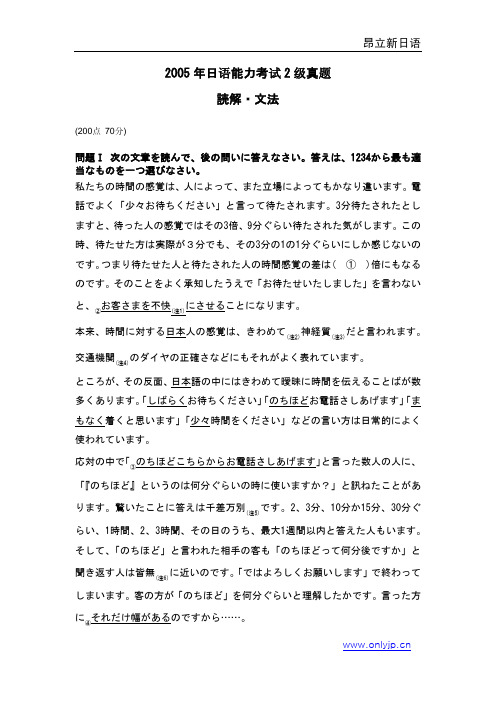
2005年日语能力考试2级真题読解・文法(200点 70分)問題Ⅰ 次の文章を読んで、後の問いに答えなさい。
答えは、1234から最も適当なものを一つ選びなさい。
私たちの時間の感覚は、人によって、また立場によってもかなり違います。
電話でよく「少々お待ちください」と言って待たされます。
3分待たされたとしますと、待った人の感覚ではその3倍、9分ぐらい待たされた気がします。
この時、待たせた方は実際が3分でも、その3分の1の1分ぐらいにしか感じないのです。
つまり待たせた人と待たされた人の時間感覚の差は( ① )倍にもなるのです。
そのことをよく承知したうえで「お待たせいたしました」を言わないと、②お客さまを不快(注1)にさせることになります。
本来、時間に対する日本人の感覚は、きわめて(注2)神経質(注3)だと言われます。
交通機関(注4)のダイヤの正確さなどにもそれがよく表れています。
ところが、その反面、日本語の中にはきわめて曖昧に時間を伝えることばが数多くあります。
「しばらくお待ちください」「のちほどお電話さしあげます」「まもなく着くと思います」「少々時間をください」などの言い方は日常的によく使われています。
応対の中で「③のちほどこちらからお電話さしあげます」と言った数人の人に、「『のちほど』というのは何分ぐらいの時に使いますか?」と訊ねたことがあります。
驚いたことに答えは千差万別(注5)です。
2、3分、10分か15分、30分ぐらい、1時間、2、3時聞、その日のうち、最大1週間以内と答えた人もいます。
そして、「のちほど」と言われた相手の客も「のちほどって何分後ですか」と聞き返す人は皆無(注6)に近いのです。
「ではよろしくお願いします」で終わってしまいます。
客の方が「のちほど」を何分ぐらいと理解したかです。
言った方に④それだけ幅があるのですから……。
「のちほど電話すると言ったから、出かけないで待ってるのにかかってこないじゃないか」と苦情になったこともあります。
2005年真题及参考答案

2005年同等学力人员申请硕士学位外国语水平全国统一考试Paper OnePartⅠ Dialogue Communication (10 minutes, 10 points)Section A Dialogue Completion1.A: Why don‟t you have dinner with me tonight?B:A.Because I have an appointment.B.Sorry about that, but I have to go to a party.C.The reason is that I have to work overtime tonight.D.I‟d love to, but I have to finish my paper.2.A: I‟m afraid I have spilled some coffee on the tablecloth.B:A. Oh, don‟t worry about that.B. You needn‟t apologize.C. I feel sorry for that.D. Oh, you shouldn‟t have done that.3. A: You seem to have a lot of work to do in your office. You‟ve always been working overtime. B:A. You are right, but don‟t you know the meaning of work?B. Sorry, I don‟t think so. I get overpaid for overwork, you know.C. That‟s right. All work and no play makes Jack a dull boy.D. That‟s right, but the work is interesting. I don‟t mind some extra hours at all.4. A: George, I would like to introduce a friend of mine, if I may: Albert Snow. Albert, this is George Smith. B:A. How have you been?B. Pleased to meet you, George.C. Mind if call you George?D. The pleasure‟s mine.5. A: Excuse me. I don‟t want to interrupt you…B:A. No, no. It‟s quite all right.B. Well, never mind.C. It won‟t bother me.D. Of course not.Section B Dialogue Comprehension6. Man: I saw John yesterday. You know what? He was driving a luxurious car.Woman: He rented it. He often makes believe that he is a millionaire.Question: What does the woman mean?A. Everyone believes that John is a millionaire.B. John dreams of becoming a millionaire.C. John dreams of having a luxurious car.D. John pretends to be a millionaire.7. Woman: I can hardly go on. The work is so tough.Man: Don‟t lose heart. I‟ll back you up all the time.Question: What does the man mean?A. He will help the woman with her work.B. He will support the woman.C. He will do the work for the woman.D. He will encourage the woman.8. Man: I didn‟t know you got a promotion. Why didn‟t you tell me earlier so that we could have celebrated it? Woman: I guess it slipped my mind. My mind was lost to other things because of work.Question: What does the woman mean?A. She felt lost with her work.B. She had a poor memory.C. She forgot to tell him.D. She had to go to work.9. Man: The new Chevy Chase film was terrific!Woman: Oh, come off it, Al. Chevy Chase is a great comedian, but he sure didn‟t show it in that movie. Question: What does the woman think of the movie?A. It‟s great comedy.B. It‟s typical Chevy Chase film.10. Woman: You haven‟t said a word about my dress, Dave. Don‟t you like it?Man: I‟m sorry I didn‟t say anything about it sooner. I don‟t think I‟ve seen anything like is before.Question: What does the man probably think of the dress?A. It is in fashion.B. It surely is unique.C. It is a bit old-fashioned.D. It surely suits her.Part Ⅱ Vocabulary (10 minutes, 10 points)Section A11.Should English classes be compulsory at the elementary or primary school level in countrieswhere it is not the native language?A. requiredB. necessaryC. selectedD. permanent讲义3.Next semester, Susan must take three compulsory courses.A. formalB. voluntaryC. practicalD. required12.In the end, both attacks and defenses of the free market and conventional economics haveimmense philosophical implications.A. traditionalB. novelC. capital-centeredD. consumption-centered 讲义9. Tiny atomic electric batteries have certain advantages over the ______ storage batteries.A. universalB. inclusiveC. indefinite22. The girl of ten has such exceptional abilities that everyone is jealous of her.A. regularB. specificC. extraordinary13.Applicant will be asked to provide information on how they will disseminate information toother students at their university or college.A. discloseB. deliverC. spreadD. analyze14.In general, the British people belong to one of the more affluent countries of Europe and enjoy ahigh standard of living compared to the rest of the world.A. plentifulB. powerfulC. friendlyD. wealthy15.To absorb a younger work force, many companies offered retirement plans as incentives forolder workers to retire and make way for the younger ones who earned lower salaries.A. rewardsB. opportunitiesC. motivesD. stimuli讲义2. The fun of playing the game was a greater incentive than the prize.A. motiveB. initiativeC. excitementD. entertainment16.Their business flourished at its new location a year later owing to their joint efforts and hardwork.A. prevailedB. failedC. boomedD. shrank讲义:11. The Timber rattlesnake is now on the endangered species list, and is extinct in two eastern states in which it once ______.A. thrivedB. swelledC. prospered17.The pressure on her from her family caused her to resort to the drastic measures.A. turn toB. keep toC. stick toD. lead to18.I shall never forget the look of intense anguish on the face of his parents when they heard thenews.A. stressB. dilemmaC. miseryD. surprise19.If minor disputes are left unsettled, tough ones will pile up sooner or later.A. accumulateB. vanishC. lingerD. emerge20.The police tried in vain to break up the protest crowds in front of the government building.A. unskillfullyB. violentlyC. ineffectivelyD. eventuallyyour department.A. satisfactionB. gratitude D. sincerity讲义:1. I' d like to take this opportunity to extend my heart-felt gratitude to the host.A. increaseB. prolongC. intensifyD. express22.The objective of this popular consultation is to determine, , the final political status of theregion, whether to remain part of the country as a special district, or to part from it.A. once upon a timeB. once and againC. all at onceD. once and for all从前一而再,屡次断然地, 坚决地23.The two countries will assign counter-drug officials to their respective embassies ona basis.A. fundamentalB. similarC. reciprocal 互惠的D. reasonable24.Tennessee‟s population is nearly two-fifths rural, and no single city or group ofcities the state.A. dominatesB. managesC. manipulatesD. controls25.We all know that in a situation like this a cool head is .A. called forB. called offC. called onD. called up讲义:9. A well-written composition ______ good choice of words and clear organization among other things.A. calls onB. calls forC. calls upD. calls off26.The destruction an earthquake causes depends on its and duration, or the amount ofshaking that occurs.A. altitudeB. magnitudeC. multitudeD. aptitude讲义:35. In my opinion, you can widen the ______ of these improvements through your active participation.A. dimensionB. volume D. scope27.The El Nino has affected the regional weather and temperature over much of the tropics,sub-tropics and some mid-latitude areas.A. externallyB. consistentlyC. insistentlyD. internally28.During all these years of absence he had a tender feeling for his mother and the family.A. enclosedB. huggedC. enrichedD. cherished29.The choice for a consumer, therefore, is the choice among the available ones that willenable him or her to maximize utility.A. optimalB. optionalC. opticalD. optimistic30.Mrs. Smith tears when she heard her daughter had died in the road accident.A. broke inB. broke upC. broke throughD. broke intoPart Ⅲ Reading Comprehension (45 minutes, 25 points)Passage OneIt was Friday, the day of the field trip on which Miss Joan would take her class to pick apples.Miss Joan enjoyed picking apples with her students. She smiled as she led her students to the bus that would take them to the Greenly Apple Orchard(果园).The bus ride was bumpy and the kids were a little noisy, but still Miss Joan was smiling.The bus stopped in front of the Greenly Orchard Store and the class got off quickly and quietly. Miss Joan made sure everyone was there. “What a glorious,sunny, apple picking day,” Miss Joan announced with her grandest smile.Mr. Greenly was there to greet them. “Let see, there are eighteen children and two adults atMiss Joan held u p the brochure in her hand. “It says that the price is two dollars each,”she pointed ort. “That‟s what I collected from everyone.”“We‟ve had to raise the price,” Mr. Greenly stated.“You sent me this brochure after we made our reservation,” Miss Joan complained, “and it says two dollars!”“Miss Joan, if you look at the bottom of this brochure,” Mr. Greenly said, “you‟ll notice a very important statement.”Sure enough, in very tiny letters, it said, “Prices are subject to change without notice.”Miss Joan was determined to keep her good mood. She took a twenty dollars bill out of her own purse and handed it to Mr. Greenly with the forty dollars she had in an envelope.“Now children, do you all have your baskets?” Miss Joan called out. “Remember, you can pic k as many apples six apples each.”“I beg your pardon!”Miss Joan was not smiling now. “The brochure says,…ALL YOU CAN PICK‟!”Mr. Greenly pointed to the tiniest letters Miss Joan had ever almost seen. It also says, “Terms and conditions of group reservat ions are subject to change without notice.”Miss Joan‟s good mood was now history. She didn‟t want to set a bad example for her students, so she said in a calm and quiet voice, “We‟re going home, give me our money back, please.”31.How many dollars did Miss Joan hand to Mr. Greenly?A. 20.B. 40.C. 60.D. 1832.The phrase “subject to change without notice” suggests .A.Mr. Greenly could change the terms at will.B.the customers should read the brochure carefullyC.Mr. Greenly could determine what apples to be picked.D.the customers should be informed beforehand.33.The students could not pick as many apples as they would like because .A.they were children.B. there were not enough apples.C. they had made a group reservation.D. they would eat up too many apples.34.“Miss Joan‟s good mood was now history?”(the last paragraph) means .A.Miss Joan had been happy until that moment.B.Miss Joan was no longer interested in history.C.Miss Joan taught her students the history of the orchard.D.Miss Joan was good at concealing her feelings35.What can we learn about Miss Joan from the story?A. She did not read the brochure carefully.B. She made a reservation after seeing the brochure.C. She lost her temper in the end.D. She didn‟t know h ow to complain.Passage TwoBoth civilization and culture are fairly modern words, having come into prominent use during the 19th century by anthropologists(人类学家), historians, and literary figures. There has been a strong tendency to use them interchangeably as though they mean the same thing, but they are not the same.Although modern in their usage, the two words derived from ancient Latin. The word civilization is based on the Latin civis, of a city. Thus civilization, in its most essential meaning, isit would seem that certain insects, such as ants or bees, are also civilized. They live and work together in social groups. So do some microorganisms. But there is more to civilization, and that is what culture brings to it. So, civilization is inseparable from culture.The word culture is derived from the Latin verb colere, till the soil. But colere also has a wider range of meanings. It may, like civis, mean inhabiting a town or village. But most of its definitions suggest a process of starting and promoting growth and development. One may cultivate a garden; one may also cultivate one‟s interests, mind, and abilities. In its modern use the word culture refers to all the positive aspects and achievements of humanity that make mankind different from the rest of the animal world. Culture has grown out of creativity, a characteristic that seems to be unique to human beings.One of the basic and best-know features of civilization and culture is the presence of tools. But more important than their simple existence is that the tools are always being improved and enlarged upon, a result of creativity. It took thousands of years to get from the first wheel to the latest, most advanced model of automobile.It is the concept of humans as toolmakers and improvers that differentiates them from other animals. A monkey may use a stick to knock a banana from a tree, but that stick will never, through a monkey‟s clevernes s, be modified into a hook or a ladder. Monkeys have never devised a spoken language, written a book, composed a melody, built a house, or painted a portrait. To say that birds build nests and beavers(海狸)their dens is to miss the point. People once lived in caves, but their cleverness, imagination, and creativity led them to progress beyond caves to buildings.36. What does the author think of the words “civilization”and “culture”?A. They are identical.B. They are different concepts.C. They can often be used interchangeably.D. They are defined differently by different people.37. According to the author the word “civilization” originally refers to .A. people‟s way of life in citiesB. people‟s ability to live together in citiesC. a type of social organizationsD. an advanced level of social life38. The Latin verb colere originally means “”.A. live in a cityB. develop oneselfC. promote growthD. cultivate the land39. The author believes that creativity .A. is a unique feature of civilized beingsB. brings forth the improvement of toolsC. is the result of human developmentD. helps the advance of culture40. The author mentions monkeys in the last paragraph to show that .A. monkeys are the same as birdsB. people once lived in caves like monkeysC. monkeys can never develop into human beingsD. man is different from other animals such as monkeysPassage ThreeThe huge growth of global “ecotourism”industry is becoming an increasing concern for conservationists with mounting evidence that many wild species do not respond well to contact with human beings. Overexposure to tourists has been linked to stress, abnormal behaviour and adverse health effects in species such as polar bears, dolphins and gorillas(大猩猩),says a report in New Scientist.While regulated ecotourism can help conservation efforts by encouraging people to manage endangered species and their habitats, many projects are poorly designed and unregulated, it says.environmentally friendly policies and operations.”While regulated ecotourism can help conservation efforts by encouraging people to manage endangered species and their habitats, “many projects are p oorly designed and hint they are based on environmentally friendly policies and operations.”Ecotourism is growing by 10 to 30 percent a year and an estimated 20 percent of tourists are thought to visit a conservation-based project. Philip Seddon, of the University of Otago in New Zealand, said that although most tourist projects conformed to basic guidelines on land use and not scaring wildlife, their full impact was rarely considered.“Transmission of disease to wildlife, or subtle changes to wildlife health through disturbance of daily routines or increased stress levels may translate to lowered survival and breeding,” he said. Research at the University of Auckland has shown that dolphins become restless and overactive when many tourist boats are present. When three or more boats are near, the dolphins rest for 0.5 percent of the time, compared with 68 percent when they are accompanied by a single boat. The findings are backed up by studies of dolphins in Britain. Researchers at the University of Manitoba in Canada have found that male polar bears easily disturbed by tourist vehicles, with a possible effect on their heart rate and metabolism(新陈代谢). That could reduce body fat levels and fitness, critical for survival.In Africa, gorillas have picked up parasites introduced to their habitat by tourists and mongooses(蠓)have caught lung diseases from human beings. Experts said that the answer to the problems was better regulation and supervision of ecotourism. The Galapagos Islands, where visitor numbers are strictly controlled, is a good model.41. Ecotourism is meant to .A. have tourists help in the conservation of wildlifeB. have wild species respond well to contact with humansC. make wild species reduce stress and abnormal behaviourD. make conservationists more concerned with wildlife42. According to New Scientist, many ecotourist projects .A. really encourage people to protect wildlife and its habitatB. strictly follow environmentally friendly policiesC. actually lack proper examination and official approvalD. seriously damage the habitats of endangered species43. What will happen to wildlife ul timately if the present “ecotourism” practice goes on?A. It will disturb their life.B. It will affect their health.C. It will increase their stress.D. It will threaten their survival.44. According to the passage, the growth in the global “ecotourism” industry .A. reflects an increasing concern for conservationB. arouses a growing concern for conservationC. coincides with a mounting concern for conservationD. originates from a grater concern for conservation45. According to the passage, a solution to the “ecotourism” problem is to .A. encourage people to manage endangered speciesB. reduce the exposure of wildlife to human beingsC. help wild animals increase their fitnessD. prevent wildlife from catching human diseasesComputers can beat chess champion Gary Kasparov at his game, count all the atoms in a nuclear explosion, and calculate complex figures in a fraction of a second, but they still fail at the slight differences in language translation. Artificial Intelligence computers have large amounts of memory, capable of storing huge translating dictionaries and extensive lists of grammar rules. Yet, today‟s best computer language translators have just a 60 percent accuracy rate. Scientist s are still unable to program the computer with human-like common sense reasoning power.Computer language translation is called Machine Translation, or MT. While not perfect, MT is surprisingly good. MT was designed to process dry, technical language that people find tedious to translate. Computers can translate basic phrases, such as “You foot bone‟s connected to your ankle bone, your ankle bone‟s connected to your leg bone.” They can translate more difficult phrases, such as “Which witch is which?” Computers can also accurately translate “Wild thing, you make my heart sing!” into other languages because they can understand individual words, as long as the words are pre-programmed in their dictionary.But highly sensitive types of translating, such as important diplomatic conversations, are beyond the scope of computer translating programs. Human translators use intuitional meaning, not logic, to process words and phrases into other languages. A human can properly translate the phrase, “The pen is in the pe n(围养禽畜的圈),” because most humans know that it means that a writing instrument is in a small enclosed space. Many times, computers do not have the ability to determine in which way two identical words in one sentence are to be used.In addition to using massive rule-programmed machines, computer programmers are also trying to teach computers to learn how to think for themselves through the “experience” of translating. Even with these efforts, programmers admit that a “thinking” computer might not ever be invented in the future.46. Computers today are capable of .A. defeating the best chess player in the worldB. telling subtle differences between languagesC. translating over 60 percent of difficult textsD. doing human-like common sense reasoning47. According to the passage, which of the following is NOT true?A. Computers can translate dry and difficult phrases.B. Computers can understand sensitive language.C. Computers can translate technical language.D. Computers can understand pre-programmed words.48. The major problem with computer translating programs is that computers .A. can not translate illogical sentencesB. do not have a large enough capacity of memoryC. can not understand grammatical rulesD. do not have intuition to process language49. To improve machine translation, computer programmers are trying to .A. use powerful rule-programmed computersB. teach computers to think by practiceC. have computers compile translating dictionariesD. add explanations of words in computer programs50. The passage suggests that .A. the accuracy rate of machine translation cannot be raisedB. it is impossible for computers to think as humans doC. only technical language is suitable for machine translationD. it is impossible to determine of identical wordsSeveral years ago during the dot-com passion, Manhattan lawyer John Kennedy sometimes wore a dark blue suit to meet potential Internet clients. But he soon realized that his conservative clothes were a strike against him before he even shook hands. So he began to do business in casual, open-shirt clothes.But now the tables have turned. Today Silicon Valley executives are the ones often coming out in suits. No wonder that Fortune 500 executives are dusting off their silk ties and pants.” I would say there is a trend now toward a little more business dress,” said Kennedy. “I find myself wearing suits more.”While there isn‟t a rush toward formal office wear, clothiers and executives say the workplace uniform is heading that way. In many offices, men are wearing jackets, ties and pants more frequently than a year age. Top women executives never went as casual as men, so the shift doesn‟t affect them as dramatically.“Business casual” took several years to catch on. It started with casual Fridays, evolved to casual summers, then became casual everyday. A return to the button-down look also will take time, observers say. Lehman Brothers is one of the few major firms that has officially returned to a formal dress policy, at least for offices that clients visit. Men were told to wear suits and ties and women to wear suits or dresses. The shift is due to a rethinking of work environments and more contacts with clients as the firm has grown.Observers mention many factors driving the trend. Internet companies helped lead the dress-down movement and other industries followed suit to attract workers. But with the collapse of many dot-coms, the relaxed look is becoming a style to avoid. Moreover, as the economy stumbles, more people are hunting for jobs or trying to keep the ones they have, and appearance counts.US President Bush wears a coat and tie in the White House office and expects his staff to dress “professionally,” which some say sets a tome for the nation.Chuck Wardell, managing director of a recruiting firm, believes a lot of employees like a stiffer uniform. “They‟re going to work. They don‟t want to feel like they‟re going to a picnic.”51.”Business casual” was prevalent several years ago because _____.A. the Manhattan law business grew very quicklyB. shaking hands with clients became popularC. the country was fighting the conservativesD. the Internet companies boomed then52. When the “bu siness ca sual” prevailed, _____.A. businessmen wore ties only in workplaceB. businessmen didn‟t wear ties at allC. businesswomen didn‟t wear formally in workplaceD. businesswomen still wore formally everywhere53. The Fortune 500 executives__________.A. set the trend toward more casual wearB. are particular about what they wearC. begin to wear suits more often than beforeD. are usually indifferent to fashion trend54. At the beginning of the “business casual” trend, business people wore casually___________.A. when meeting clientsB. on weekendsC. in summerD. almost every day55. It is implied in the passage that the change of business dress from the casual to the formalreflects_____.A. the changed of people‟s taste in fashionB. the ups and downs of the fashion industryC. the ups and downs of the Internet companiesD. people‟s different preference in business dressPart IV CloseThe United States has historically had higher rates of marriage than those of other industrialized countries. The current annual marriage 56 in the United States ---about 9 new marriages for every 1,000 people ---is 57 higher than it is in other industrialized countries. However, marriage is 58 as widespread as it was several decades ago. 59 of American adults who are married 60 _ form 72 percent in 1970 to 60 percent in 2002.This does not mean that large numbers of people will remain unmarried 61 their lives. Throughout the 20th century, about 90 percent of Americans married at some 62 in their lives. Experts_ 63 that about the same proportion of today‟s young adults will eventually marry.The timing of marriage has varied 64 over the past century. In 1995 the average age of women in the United States at the time of their first marriage was 25.The average age of men was about 27.Men and women in the United States marry for the first time at an average of five years later than people did in the 1950s. 65 ,young adults of the 1950s married younger than did any previous 66 in U.S. history. Today‟s later age of marriage is 67 the age of marriage between 1890 and 1940. Moreover, a greater proportion of the population was married (95 percent)during the 1950s than at any time before 68 .Experts do not agree on why the “marriage rush” of the late 1940s and 1950s occurred, but most social scientists believe it represented a 69 to the return of peaceful life and prosperity after 15 years of severe economic 70 and war.56. A. rate B. ratio C. percentage D. poll57. A. potentially B. intentionally C. randomly D. substantially相当大的58. A. not any longer B. no more C. no longer D. not any more59. A. A proportion B. The proportion C. The number D. A number60. A. declined B. deteriorated C. deduced D. demolished61. A. past B. passing C. throughout D. through62. A. period B. level C. point D. respect63. A. project B. plan C. promise D. propose64. A . unexpectedly B. irregularly C. flexibly D. consistently65. A. Besides B. However C. Whereas D. Nevertheless66. A. descendants B. ascendants C. population D. generation67. A. according to B. in line with C. based on D. caused by68. A. and after B. or after C. or since D. ever since69. A. refusal B. realization C. response D. reality70. A. repression B. aggression C. restriction D. depressionPart V Error Detection71. It is an accepted custom for guests to take their gifts to the wedding reception when the coupleinvited them to attend.72. Some international students use a cassette recorder to make tapes of their classes so that theycan repeat the lectures again.73. Despite of diligent efforts to promote domestic production during the war years, the ContinentalArmy had to rely primarily on captures and imports for much of its military hardware and even for clothing.74. In a sense, farmers began primitive genetic engineering at the dawn of agriculture, which theykept seeds from their best plants, gradually improving the quality of successive generations.。
2005日语专业四级考试试题_答案
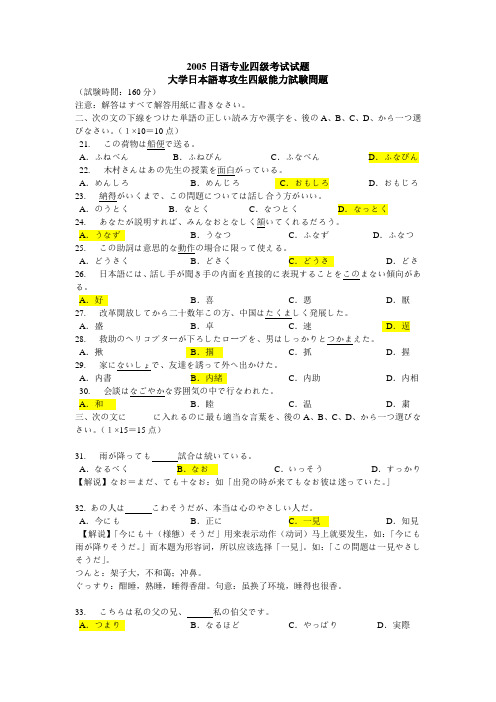
2005日语专业四级考试试题大学日本語専攻生四級能力試験問題(試験時間:160分)注意:解答はすべて解答用紙に書きなさい。
二、次の文の下線をつけた単語の正しい読み方や漢字を、後のA、B、C、D、から一つ選びなさい。
(1×10=10点)21. この荷物は船便で送る。
A.ふねべんB.ふねびんC.ふなべんD.ふなびん22. 木村さんはあの先生の授業を面白がっている。
A.めんしろB.めんじろC.おもしろD.おもじろ23. 納得がいくまで、この問題については話し合う方がいい。
A.のうとくB.なとくC.なつとくD.なっとく24. あなたが説明すれば、みんなおとなしく頷いてくれるだろう。
A.うなずB.うなつC.ふなずD.ふなつ25. この助詞は意思的な動作の場合に限って使える。
A.どうさくB.どさくC.どうさD.どさ26. 日本語には、話し手が聞き手の内面を直接的に表現することをこのまない傾向がある。
A.好B.喜C.悪D.厭27. 改革開放してから二十数年この方、中国はたくましく発展した。
A.盛B.卓C.速D.逞28. 救助のヘリコプターが下ろしたロープを、男はしっかりとつかまえた。
A.揪B.掴C.抓D.握29. 家にないしょで、友達を誘って外へ出かけた。
A.内書B.内緒C.内助D.内相30. 会談はなごやかな雰囲気の中で行なわれた。
A.和B.睦C.温D.粛三、次の文にに入れるのに最も適当な言葉を、後のA、B、C、D、から一つ選びなさい。
(1×15=15点)31.A.なるべくC.いっそうD.すっかり【解说】なお=まだ、ても+なお:如「出発の時が来てもなお彼は迷っていた。
」32. あの人はこわそうだが、本当は心のやさしい人だ。
A.今にもB.正にC.一見D.知見【解说】「今にも+(様態)そうだ」用来表示动作(动词)马上就要发生,如:「今にも雨が降りそうだ。
」而本题为形容词,所以应该选择「一見」。
2005年日语能力考试1级真题-读解文法

2005年日语能力考试1级真题読解・文法(200点 90分)問題Ⅰ 次の文章を読んで、後の問いに答えなさい。
答えは、1・2・3・4から最も適当なものを一つ選びなさい。
来世紀に向けて、個人レベルであれ地域祉会・地球規模であれ、科学技術の進歩ゆえに いっそう複維になっていく問題に対して、個人が判断しなくてはならない局面が増えていくことだろう。
その時に自分なりに納得のいく判断を下すためには、科学に無関心・無理 解を決めこんだ(注1)りせず、ふだんかち科学に日を向け、科学的な考え方にふれている必要があるだろう。
つまり、①科学と社会を結びつける良質の情報が必要なのである。
その情報は自分の行動に役立てるために受信するだけではなく、場合によっては、自ら責任ある発信者となるために役立てることも大切である。
残念なことに、科学者がもたらした成果は、そのままでは判断材料としては②役に立たないことが多い。
まず、専門用語ゆえに科学はとりつきにくい。
科学が高度になり細分化したために、領域が異なれば科学者でも理解が困難な状況になってしまっている。
良質の情報は優れた③表現能力をともなわなくてはならないが、実際のところ、研究に専念している科学者には時聞的余裕がなく、そうした表現能力を磨くいとま(注2)ないのが普通である。
も一方で、④科学者にも良質の情報が必要である。
科学者は何かしら新しいことを世界に先駆けて発見・発表することに熱中するものである。
その結果が化学・生物・核兵器の開発に加担する(注3)ことはないか、あるいはわれわれの生活ないしは地球という生態系(注4)に思いもよらぬ影響を与えることがないかに思い(注5)を馳せる機会は、必ずしも多くはない。
⑤こうした点に関して、科学者は外部から指摘される必要がある。
( ⑥ )、最先端の科学の研究成果とその社会的意味を科学に慣れ親しんでいない人に、また杜会的意味については科学者に対しても改めて説明する人材、つまり科学の"インタープリター"が必要となる。
2005年能力考2级真题详解
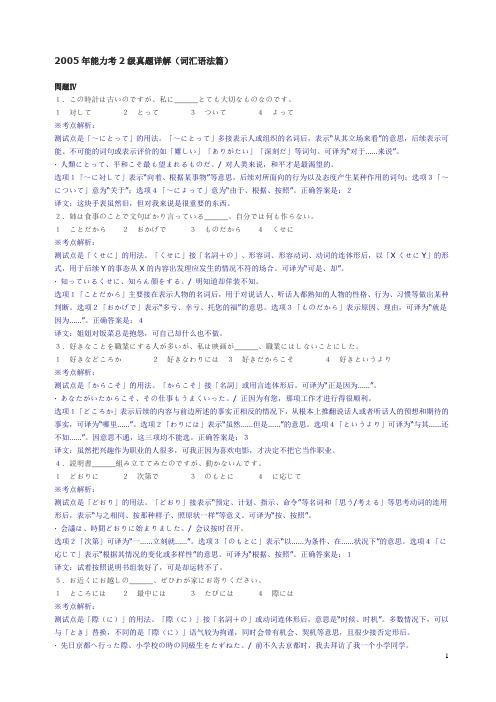
2005年能力考2级真题详解(词汇语法篇)問題Ⅳ1.この時計は古いのですが、私に_____とても大切なものなのです。
1対して2とって3ついて4よって※考点解析:测试点是「~にとって」的用法。
「~にとって」多接表示人或组织的名词后,表示“从其立场来看”的意思,后续表示可能、不可能的词句或表示评价的如「難しい」「ありがたい」「深刻だ」等词句。
可译为“对于……来说”。
·人類にとって、平和こそ最も望まれるものだ。
/ 对人类来说,和平才是最渴望的。
选项1「~に対して」表示“向着、根据某事物”等意思,后续对所面向的行为以及态度产生某种作用的词句;选项3「~について」意为“关于”;选项4「~によって」意为“由于、根据、按照”。
正确答案是:2译文:这块手表虽然旧,但对我来说是很重要的东西。
2.姉は食事のことで文句ばかり言っている_____、自分では何も作らない。
1ことだから2おかげで3ものだから4くせに※考点解析:测试点是「くせに」的用法。
「くせに」接「名詞+の」、形容词、形容动词、动词的连体形后,以「XくせにY」的形式,用于后续Y的事态从X的内容出发理应发生的情况不符的场合。
可译为“可是、却”。
·知っているくせに、知らん顔をする。
/ 明知道却佯装不知。
选项1「ことだから」主要接在表示人物的名词后,用于对说话人、听话人都熟知的人物的性格、行为、习惯等做出某种判断。
选项2「おかげで」表示“多亏、幸亏、托您的福”的意思。
选项3「ものだから」表示原因、理由,可译为“就是因为……”。
正确答案是:4译文:姐姐对饭菜总是抱怨,可自己却什么也不做。
3.好きなことを職業にする人が多いが、私は映画が_____、職業にはしないことにした。
1好きなどころか2好きなわりには3好きだからこそ4好きというより※考点解析:测试点是「からこそ」的用法。
「からこそ」接「名詞」或用言连体形后。
可译为“正是因为……”。
·あなたがいたからこそ、その仕事もうまくいった。
2005年日语能力考试2级真题-文字词汇
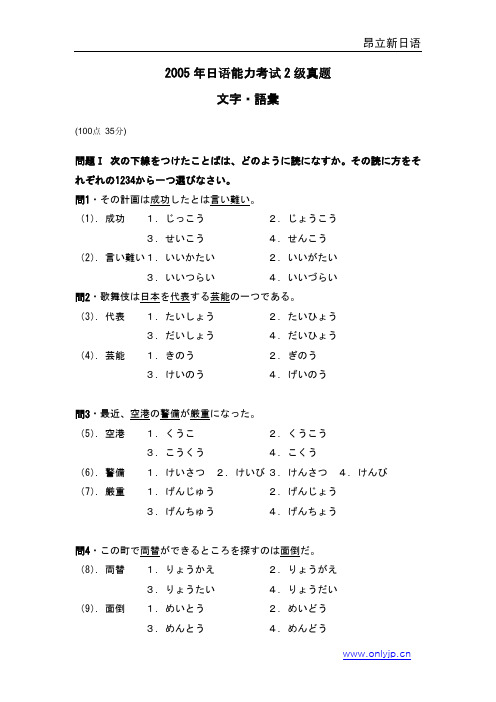
2005年日语能力考试2级真题文字・語彙(100点 35分)問題Ⅰ 次の下線をつけたことばは、どのように読になすか。
その読に方をそれぞれの1234から一つ選びなさい。
問1・その計画は成功したとは言い難い。
(1).成功 1.じっこう 2.じょうこう3.せいこう 4.せんこう(2).言い難い1.いいかたい 2.いいがたい3.いいつらい 4.いいづらい問2・歌舞伎は日本を代表する芸能の一つである。
(3).代表 1.たいしょう 2.たいひょう3.だいしょう 4.だいひょう(4).芸能 1.きのう 2.ぎのう3.けいのう 4.げいのう問3・最近、空港の警備が厳重になった。
(5).空港 1.くうこ 2.くうこう3.こうくう 4.こくう(6).警備 1.けいさつ 2.けいび 3.けんさつ 4.けんび (7).厳重 1.げんじゅう 2.げんじょう3.げんちゅう 4.げんちょう問4・この町で両替ができるところを探すのは面倒だ。
(8).両替 1.りょうかえ 2.りょうがえ3.りょうたい 4.りょうだい(9).面倒 1.めいとう 2.めいどう3.めんとう 4.めんどう問5・ここ数年、高校、大学への進学率はやや減っているようだ。
(10).数年 1.すうねん 2.すねん 3.そうねん 4.そねん (11).進学率 1.しんがくいつ 2.しんがくいつ3.しんがくそつ 4.しんがくりつ (12).減って 1.あまって 2.いたって 3.そって 4.へって問6・君は賢い 選択をしたね。
(13).賢い 1.かしこい 2.きつい 3.すごい 4.するどい (14).選択 1.せいたく 2.ぜいたく 3.せんたく 4.ぜんたく問7・この町の主な産業は漁業だ。
(15).主な 1.あらたな 2.おもな 3.まれな 4.ゆたかな (16).漁業 1.ぎょうぎょう 2.ぎょぎょう3.りょうぎょう 4.りょぎょう問8・アジア諸国の経済について講演を行った。
2005年日语能力考试3级真题及答案(全)
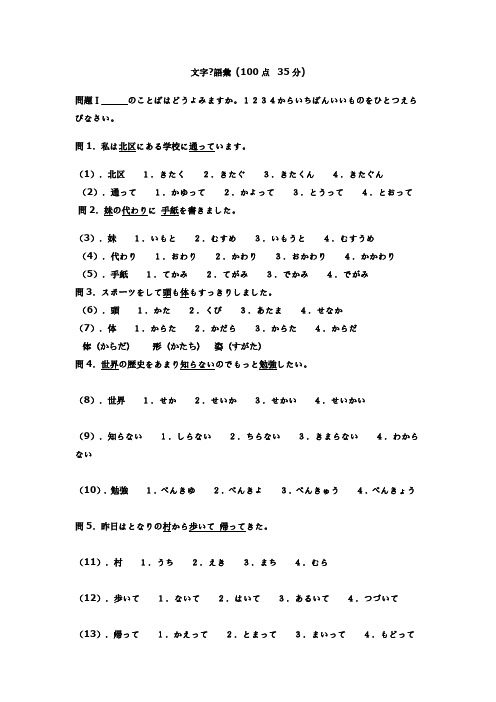
文字?語彙(100点35分)問題Ⅰ___のことばはどうよみますか。
1234からいちばんいいものをひとつえらびなさい。
問1.私は北区にある学校に通っています。
(1).北区1.きたく2.きたぐ3.きたくん4.きたぐん(2).通って1.かゆって2.かよって3.とうって4.とおって問2.妹の代わりに手紙を書きました。
(3).妹1.いもと2.むすめ3.いもうと4.むすうめ(4).代わり1.おわり2.かわり3.おかわり4.かかわり(5).手紙1.てかみ2.てがみ3.でかみ4.でがみ問3.スポーツをして頭も体もすっきりしました。
(6).頭1.かた2.くび3.あたま4.せなか(7).体1.からた2.かだら3.からた4.からだ体(からだ)形(かたち)姿(すがた)問4.世界の歴史をあまり知らないのでもっと勉強したい。
(8).世界1.せか2.せいか3.せかい4.せいかい(9).知らない1.しらない2.ちらない3.きまらない4.わからない(10).勉強1.べんきゆ2.べんきよ3.べんきゅう4.べんきょう問5.昨日はとなりの村から歩いて帰ってきた。
(11).村1.うち2.えき3.まち4.むら(12).歩いて1.ないて2.はいて3.あるいて4.つづいて(13).帰って1.かえって2.とまって3.まいって4.もどって問6.このスーツケースは重くて不便です。
(14).重くて1.あつくて2.おもくて3.ふかくて4.まずくて(15).不便1.ふびん2.ふべん3.ふうびん4.ふうべん問7.この門は子どもの力では開けられません。
(16).門1.と2.はこ3.まど4.もん(17).力1.ちから2.ちがら3.つから4.つがら(18).開けられません1.あけられません2.うけられません3.かけられません4.つけられません問8.よく考えてから質問に答えてください。
(19).考えて1.おぼえて2.つたえて3.かんがえて4.まちがえて(20).質問1.しつもん2.せつめい3.せんもん4.しょうめい問題Ⅱ_______のことばは漢字をつかってどう書きますか。
2005年日语能力考二级真题读解部分03

2005年日语能力考二级真题读解部分。
考生们在日语备考中都会看大量资料,做大量习题来提高日语水平,可是在能力考前还是不能确定自己的掌握情况,那就让往年二级真题来帮你检测一下吧!問題Ⅲ次の(1)から(5)の文章を読んで、それぞれの問いに対する答えとして最も適当なものを1・2・3・4から一つ選びなさい。
(1) 子どもたちの何かが変わってきた——。
いまの子どもたちが一番変わったところは、自分を語れなくなったこと。
少し前の子どもたちは、「どうして悪いことをしてしまったの.」と問いかけると、「どうしてそうなっちゃったんだろう」と、それなりに(注)一生懸命考えて答えを出してよこしたものだが、いま、そう問いかけても答えられなくなくている。
おしゃベリはよくするのに、自分の心を言葉にするのは苦手で、自分を理解してもらおうという努力がないのである。
これは、自分を語るという場が少なく、経験もないからに違いない。
(野代仁子『非行を叱る~カウンセラーのノートから』文藝春秋による)(注)それなりに:その入ができる範囲で【問い】少し前の子どもと比べて、いまの子どもが変わったところはどんな点か。
1 自分の気持ちを口に出すことができなくなったこと2 自分の心を言葉で言い表すことがじょうずになったこと3 自分を語る機会が増えて、おしゃべりをよくするようになったこと4 悪いことをした理由を聞かれた時、よく考えないと答えられなくなったこと(2) イアン様先日はお便りありがとうございました。
こちらこそごぶさたしております。
卒業記念発表会のご案内状もありがとうございました。
ホームステイでわが家にいらっしゃった時は、まだ来日なさったばかりでしたのに、もう2年にもなるのですね。
ほんとうに早いものです。
あの時はほとんど日本語が話せなかったので心配でしたが、発表会では大勢の人の前で日本語で話されるのですね。
本当に驚きました。
発表会へは、家族そろって、うかがうつもりです。
4级 2005
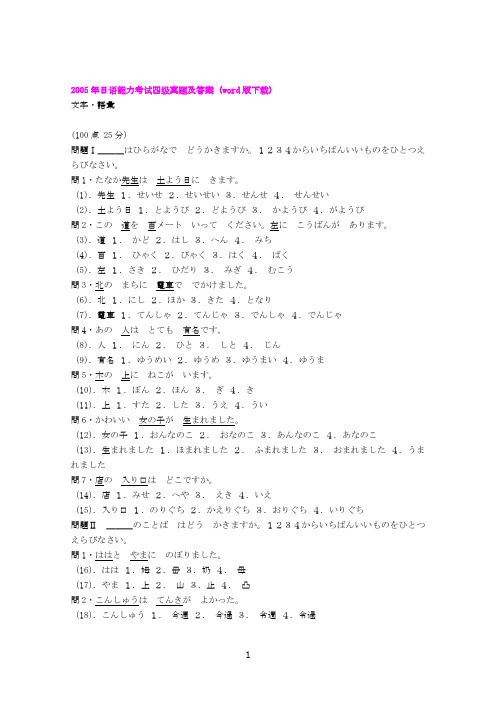
2005年日语能力考试四级真题及答案(word版下载)文字・語彙(100点 25分)問題Ⅰ___はひらがなでどうかきますか。
1234からいちばんいいものをひとつえらびなさい。
問1・たなか先生は土よう日にきます。
(1).先生1.せいせ2.せいせい3.せんせ4.せんせい(2).土よう日1.とようび2.どようび3.かようび4.がようび問2・この道を百メートいってください。
左にこうばんがあります。
(3).道1.かど2.はし3.へん4.みち(4).百1.ひゃく2.びゃく3.はく4.ばく(5).左1.さき2.ひだり3.みぎ4.むこう問3・北のまちに電車ででかけました。
(6).北1.にし2.ほか3.きた4.となり(7).電車1.てんしゃ2.てんじゃ3.でんしゃ4.でんじゃ問4・あの人はとても有名です。
(8).人1.にん2.ひと3.しと4.じん(9).有名1.ゆうめい2.ゆうめ3.ゆうまい4.ゆうま問5・木の上にねこがいます。
(10).木1.ぼん2.ほん3.ぎ4.き(11).上1.すた2.した3.うえ4.うい問6・かわいい女の子が生まれました。
(12).女の子1.おんなのこ2.おなのこ3.あんなのこ4.あなのこ(13).生まれました1.ほまれました2.ふまれました3.おまれました4.うまれました問7・店の入り口はどこですか。
(14).店1.みせ2.へや3.えき4.いえ(15).入り口1.のりぐち2.かえりぐち3.おりぐち4.いりぐち問題Ⅱ___のことばはどうかきますか。
1234からいちばんいいものをひとつえらびなさい。
問1・ははとやまにのぼりました。
(16).はは1.姆2.毌3.奶4.母(17).やま1.上2.山3.止4.凸問2・こんしゅうはてんきがよかった。
(18).こんしゅう1.今週2.今過3.令週4.令過(19).てんき1.天気2.天汽3.矢気4.矢汽問3・そのちいさいかれんだーをください。
(20).ちいさい1.小い2.小さい3.少い4.少さい(21).かれんだー1.カトングー2.カトンダー3.カレングー4.カレンダー問4・ひがしのそらがきれいです。
05日语真题
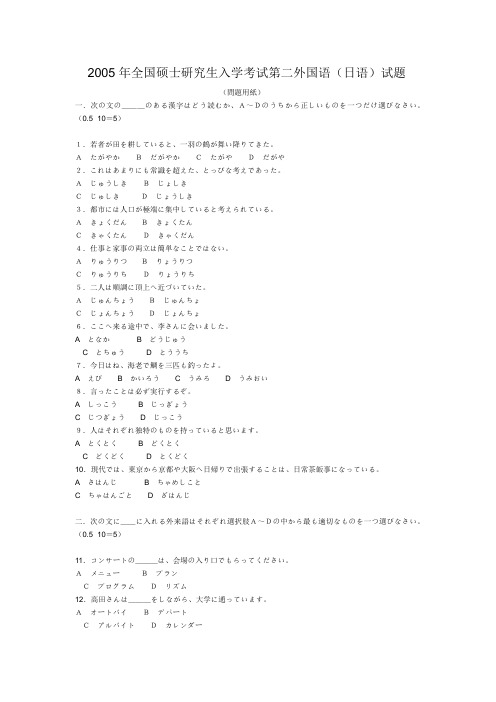
2005年全国硕士研究生入学考试第二外国语(日语)试题(問題用紙)一.次の文の___のある漢字はどう読むか、A~Dのうちから正しいものを一つだけ選びなさい。
(0.5×10=5)1.若者が田を耕していると、一羽の鶴が舞い降りてきた。
AたがやかBだがやかCたがやDだがや2.これはあまりにも常識を超えた、とっぴな考えであった。
AじゅうしきBじょしきCじゅしきDじょうしき3.都市には人口が極端に集中していると考えられている。
AきょくだんBきょくたんCきゃくたんDきゃくだん4.仕事と家事の両立は簡単なことではない。
AりゅうりつBりょうりつCりゅうりちDりょうりち5.二人は順調に頂上へ近づいていた。
AじゅんちょうBじゅんちょCじょんちょうDじょんちょ6.ここへ来る途中で、李さんに会いました。
AとなかBどうじゅうCとちゅうDとううち7.今日はね、海老で鯛を三匹も釣ったよ。
AえびBかいろうCうみろDうみおい8.言ったことは必ず実行するぞ。
AしっこうBじっぎょうCじつぎょうDじっこう9.人はそれぞれ独特のものを持っていると思います。
AとくとくBどくとくCどくどくDとくどく10.現代では、東京から京都や大阪へ日帰りで出張することは、日常茶飯事になっている。
AさはんじBちゃめしことCちゃはんごとDざはんじ二.次の文に__に入れる外来語はそれぞれ選択肢A~Dの中から最も適切なものを一つ選びなさい。
(0.5×10=5)11.コンサートの___は、会場の入り口でもらってください。
AメニューBプランCプログラムDリズム12.高田さんは___をしながら、大学に通っています。
AオートバイBデパートCゕルバイトDカレンダー13.自動車や機械などを操作するために__を回す。
AパイプBボタンCピンDハンドル14.今年、文学賞をもらった作家に新聞記者が__をして記事を書いた。
AインタビューBステージCレクリエーションDコンクール15.有名なレストランに出かけたが、店は休みで__が閉まっていた。
2005日语专业四级考试试题_答案
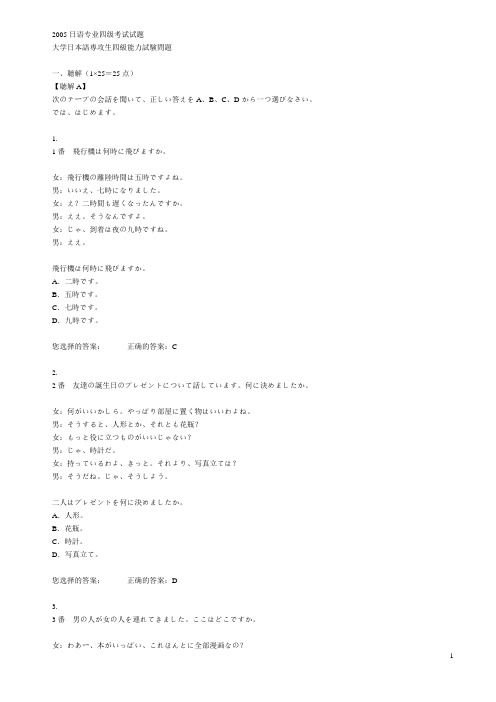
2005日语专业四级考试试题大学日本語専攻生四級能力試験問題一、聴解(1×25=25点)【聴解A】次のテープの会話を聞いて、正しい答えをA、B、C、Dから一つ選びなさい。
では、はじめます。
1.1番飛行機は何時に飛びますか。
女:飛行機の離陸時間は五時ですよね。
男:いいえ、七時になりました。
女:え?二時間も遅くなったんですか。
男:ええ。
そうなんですよ。
女:じゃ、到着は夜の九時ですね。
男:ええ。
飛行機は何時に飛びますか。
A.二時です。
B.五時です。
C.七時です。
D.九時です。
您选择的答案:正确的答案:C2.2番友達の誕生日のプレゼントについて話しています。
何に決めましたか。
女:何がいいかしら。
やっぱり部屋に置く物はいいわよね。
男:そうすると、人形とか、それとも花瓶?女:もっと役に立つものがいいじゃない?男:じゃ、時計だ。
女:持っているわよ、きっと。
それより、写真立ては?男:そうだね。
じゃ、そうしよう。
二人はプレゼントを何に決めましたか。
A.人形。
B.花瓶。
C.時計。
D.写真立て。
您选择的答案:正确的答案:D3.3番男の人が女の人を連れてきました。
ここはどこですか。
女:わあー、本がいっぱい、これほんとに全部漫画なの?男:そうだよ。
店員:いらっしゃいませ。
何になさいますか。
男:コーヒー二つ。
女:コーヒーいっぱいで、ずっといいの?男:うんん、一時間すぎったら追加料金払うんだ。
女:へえー、まるで駐車料金みたい。
二人はどこで話していますか。
A.資料室です。
B.料理屋です。
C.喫茶店です。
D.駐車場です。
您选择的答案:正确的答案:C4.4番女の人は何番のバスに乗りますか。
女:あの、新宿へ行くバスは何番ですか。
男:えーと、新宿へ行くのは六番ですね。
女:そうですか。
有難うございます。
男:あ、そちらじゃありませんよ。
そちらは八番と九番と十一番です。
六番はこちらです。
女:ああ、どうも。
女の人は何番のバスに乗りますか。
2005年日语能力测试语法真题解析
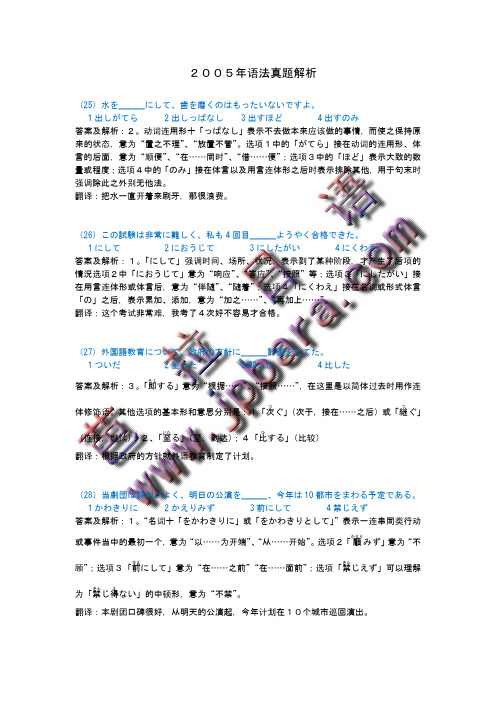
2005年语法真题解析(25)水を______にして、歯を磨くのはもったいないですよ。
1出しがてら 2出しっぱなし 3出すほど 4出すのみ答案及解析:2。
动词连用形十「っぱなし」表示不去做本来应该做的事情,而使之保持原来的状态,意为“置之不理”、“放置不管”。
选项1中的「がてら」接在动词的连用形、体言的后面,意为“顺便”、“在……同时”、“借……便”;选项3中的「ほど」表示大致的数量或程度;选项4中的「のみ」接在体言以及用言连体形之后时表示排除其他,用于句末时强调除此之外别无他法。
翻译:把水一直开着来刷牙,那很浪费。
(26)この試験は非常に難しく、私も4回目______ようやく合格できた。
1にして 2におうじて 3にしたがい 4にくわえ答案及解析:1。
「にして」强调时间、场所、状况,表示到了某种阶段,才产生了后项的情況选项2中「におうじて」意为“响应”、“答应”、“按照”等;选项3「にしたがい」接在用言连体形或体言后,意为“伴随”、“随着”;选项4「にくわえ」接在名词或形式体言「の」之后,表示累加、添加,意为“加之……”、“再加上……”。
翻译:这个考试非常难,我考了4次好不容易才合格。
(27)外国語教育について、政府の方針に______計画を立てた。
1ついだ 2至った 3即した 4比した答案及解析:3。
「即そくする」意为“根据……”、“按照……”,在这里是以简体过去时用作连体修饰语。
其他选项的基本形和意思分别是:1「次つぐ」(次于,接在……之后)或「継つぐ」(连接,继续);2、「至いたる」(至,到达);4「比ひする」(比较)翻译:根据政府的方针就外语教育制定了计划。
(28)当劇団は評判がよく、明日の公演を______、今年は10都市をまわる予定である。
1かわきりに 2かえりみず 3前にして 4禁じえず答案及解析:1。
“名词十「をかわきりに」或「をかわきりとして」”表示一连串同类行动或事件当中的最初一个,意为“以……为开端”、“从……开始”。
外研社 日语能力考试真题解析2级 听力和阅读翻译2005
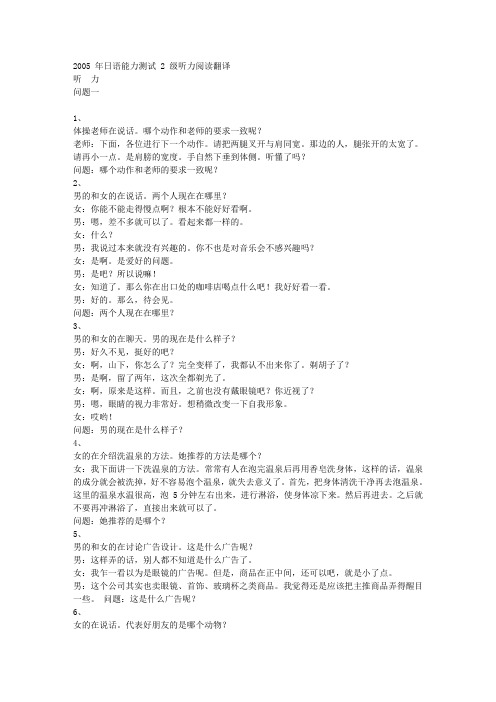
2005 年日语能力测试 2 级听力阅读翻译听力问题一1、体操老师在说话。
哪个动作和老师的要求一致呢?老师:下面,各位进行下一个动作。
请把两腿叉开与肩同宽。
那边的人,腿张开的太宽了。
请再小一点。
是肩膀的宽度。
手自然下垂到体侧。
听懂了吗?问题:哪个动作和老师的要求一致呢?2、男的和女的在说话。
两个人现在在哪里?女:你能不能走得慢点啊?根本不能好好看啊。
男:嗯,差不多就可以了。
看起来都一样的。
女:什么?男:我说过本来就没有兴趣的。
你不也是对音乐会不感兴趣吗?女:是啊。
是爱好的问题。
男:是吧?所以说嘛!女:知道了。
那么你在出口处的咖啡店喝点什么吧!我好好看一看。
男:好的。
那么,待会见。
问题:两个人现在在哪里?3、男的和女的在聊天。
男的现在是什么样子?男:好久不见,挺好的吧?女:啊,山下,你怎么了?完全变样了,我都认不出来你了。
剃胡子了?男:是啊,留了两年,这次全都剃光了。
女:啊,原来是这样。
而且,之前也没有戴眼镜吧?你近视了?男:嗯,眼睛的视力非常好。
想稍微改变一下自我形象。
女:哎哟!问题:男的现在是什么样子?4、女的在介绍洗温泉的方法。
她推荐的方法是哪个?女:我下面讲一下洗温泉的方法。
常常有人在泡完温泉后再用香皂洗身体,这样的话,温泉的成分就会被洗掉,好不容易泡个温泉,就失去意义了。
首先,把身体清洗干净再去泡温泉。
这里的温泉水温很高,泡 5分钟左右出来,进行淋浴,使身体凉下来。
然后再进去。
之后就不要再冲淋浴了,直接出来就可以了。
问题:她推荐的是哪个?5、男的和女的在讨论广告设计。
这是什么广告呢?男:这样弄的话,别人都不知道是什么广告了。
女:我乍一看以为是眼镜的广告呢。
但是,商品在正中间,还可以吧,就是小了点。
男:这个公司其实也卖眼镜、首饰、玻璃杯之类商品。
我觉得还是应该把主推商品弄得醒目一些。
问题:这是什么广告呢?6、女的在说话。
代表好朋友的是哪个动物?女:在我们国家,可以根据梦见的动物来圆梦。
通常情况下,白色的动物象征幸运。
2005年日语能力考试2级真题-文字词汇
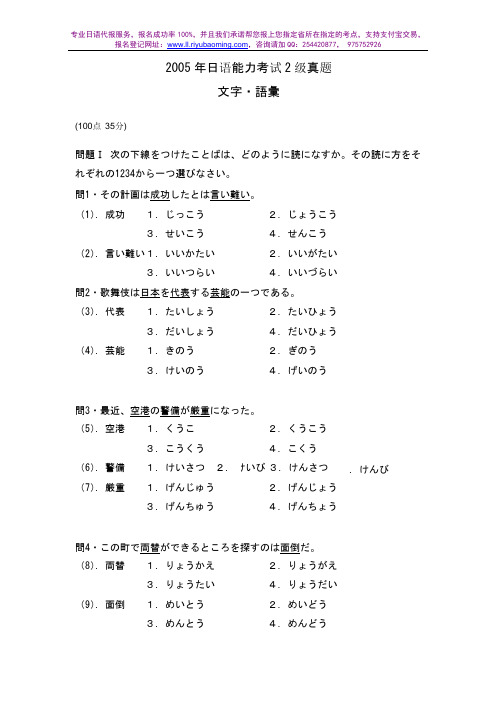
专业日语代报服务,报名成功率100%,并且我们承诺帮您报上您指定省所在指定的考点,支持支付宝交易,报名登记网址: ,咨询请加QQ :254420877, 975752926(5).空港 1.くうこ2.くうこう4.こくうけいび 3.けんさつ 4 3.こうくう(6).警備1.けいさつ 2. (7).厳重 1.げんじゅう 2.げんじょう 3.げんちゅう4.げんちょう2005 年日语能力考试 2 级真题文字・語彙(100点 35分)問題Ⅰ 次の下線をつけたことばは、どのように読になすか。
その読に方をそ れぞれの1234から一つ選びなさい。
問1・その計画は成功したとは言い難い。
(1).成功1.じっこう 2.じょうこう 3.せいこう4.せんこう(2).言い難い1.いいかたい2.いいがたい 3.いいつらい4.いいづらい問2・歌舞伎は日本を代表する芸能の一つである。
(3).代表 1.たいしょう 2.たいひょう3.だいしょう 4.だいひょう (4).芸能 1.きのう 2.ぎのう3.けいのう4.げいのう問3・最近、空港の警備が厳重になった。
.けんび問4・この町で両替ができるところを探すのは面倒だ。
(8).両替1.りょうかえ 2.りょうがえ3.りょうたい4.りょうだい(9).面倒1.めいとう 2.めいどう3.めんとう4.めんどう(15).主な1.あらたな 2.おもな 3.まれな4(16).漁業1.ぎょうぎょう 2.ぎょぎょう 3.りょうぎょう4.りょぎょう(19).賞1.しょ 2.し う 3.じょ 4.じょう(20).偉い 1.ありがたい 2.めでたい 3.えらい4.いい問5・ここ数年、高校、大学への進学率はやや減っているようだ。
(10).数年1.すうねん 2.すねん3.そうねん 4.そねん(11).進学率 1.しんがくいつ2.しんがくいつ3.しんがくそつ4.しんがくりつ(12).減って 1.あまって 2.いたって 3.そって4.へって問6・君は賢い 選択をしたね。
2005年N1真题 及 答案
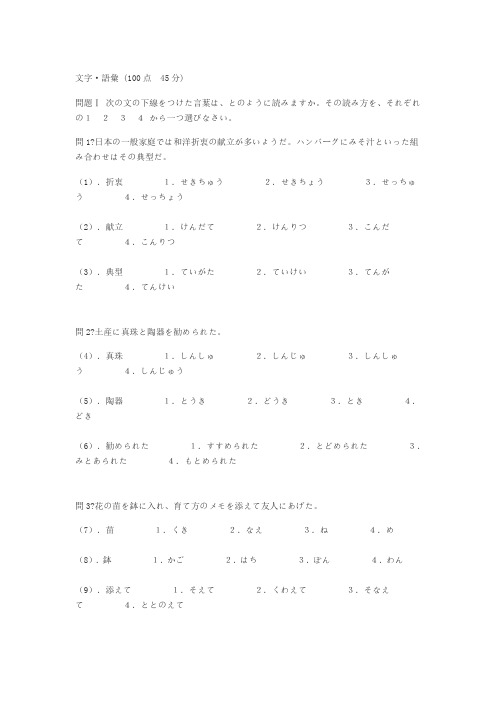
文字·語彙 (100点45分)問題Ⅰ次の文の下線をつけた言葉は、とのように読みますか。
その読み方を、それぞれの1234から一つ選びなさい。
問1?日本の一般家庭では和洋折衷の献立が多いようだ。
ハンバーグにみそ汁といった組み合わせはその典型だ。
(1).折衷1.せきちゅう2.せきちょう3.せっちゅう4.せっちょう(2).献立1.けんだて2.けんりつ3.こんだて4.こんりつ(3).典型1.ていがた2.ていけい3.てんがた4.てんけい問2?土産に真珠と陶器を勧められた。
(4).真珠1.しんしゅ2.しんじゅ3.しんしゅう4.しんじゅう(5).陶器1.とうき2.どうき3.とき4.どき(6).勧められた1.すすめられた2.とどめられた3.みとあられた4.もとめられた問3?花の苗を鉢に入れ、育て方のメモを添えて友人にあげた。
(7).苗1.くき2.なえ3.ね4.め(8).鉢1.かご2.はち3.ぼん4.わん(9).添えて1.そえて2.くわえて3.そなえて4.ととのえて問4?彼は連日徹夜で練習し、本番に臨んだ。
(10).連日1.れんじつ2.れんにち3.れんか4.れんぴ(11).徹夜1.ていや2.ていよ3.てつや4.てつよ(12).臨んだ1.いどんだ2.からんだ3.のぞんだ4.はげんだ問5?学校の復興に尽くし、生徒たちから慕われていた田中先生が老衰で亡くなったそうだ。
(13).復興1.ふくこう2.ふくきょう3.ふっこう4.ふっきょう(14).慕われて1.したわれて2.になわれて3.うやまわれて4.したがわれて(15).老衰1.おいあい2.おいすい3.ろうあい4.ろうすい問題II 次の文の下線をつけた言葉は、ひらがなでどう書きますか。
同じひらがなで書く言葉を、1234から一つ選びなさい。
(16).道に倒れていた人を介抱した。
1.情報2.開放3.解剖4.窮乏(17).事業に失敗して、大きな負債が残った。
1.不正2.夫妻3.宝石4.紡績(18).新しい本社ビルがいよいよ来週披露される。
2005年全国普通高校日语考试

2005年普通高等学校招生全国统一考试日语第二部分:日语知识运用(共40小题:每小题1分,满分40分)16. 子供が遊んでいるの見えます。
AはBがCにDを17. 今度の会議はいつしますか。
AにBがCかDで18. きみなら、必ず成功する信じている。
AとBがCかDを19. 若いころお酒が飲めなくなりました。
AまでBぐらいCほどDしか20. ガソリンは石油作られる。
AからBがCにDで21. 北国の冬は大変です。
特に大雪の時は、雪が降り積もって、2階から出入りしなければならないです。
AまでBうえCほどDだけ22. かれのほうが悪いんだから、きみのほうから謝りに行くはないよ。
AものBことCしかDところ23. 私が歌手の道を選んだのはよくよく考えたのことなのだ。
AまでBわけでCばかりDうえで24. すべての病気が西洋医学で治せる。
AところではありませんBわけではありませんCことではありませんDはずではありません25. 笑顔だったを見ると、すべてうまくいったようです。
AところBわけCほどDもの26. ホテルのにいすがあるので、そこで待っていてください。
AホームBロビーCトンネルDデパート27. その日は寒かったと見えて、にはだれも入っていなかった。
AルールBスキーCプールDスケート28. この曲を聞く、ふるさとの自然を思い出す。
AだけにBかぎりCところDたびに29. 信じられないことだが、やはり新聞に出ている以上、事実に。
A関係ないB限らないC違いないDありえない30. この靴、ちょっとぼくには過ぎるよ。
A大きいB大きC大きくD大きさ31. 親は子供を厳しく叱る、やさしくほめてあげることも忘れてはいけない。
AばかりにBかわりにCうえにDうちに32. 隠していても分かることだから、話したほうがいいよ。
A正直だB正直でC正直なD正直に33. ぜひ試験に合格できますと、彼女は手を合わせて祈った。
AためにBなんてCかぎりDように34. イギリスの学生、日本語を学ぶ学生は、たいてい漢字が難しいと言う。
2005历年日语考研真题

2005年全国硕士研究生入学考试统一考试日语试题Ⅰ.基礎知識(20点)次の文章を読んで、1~20の問いに答えなさい。
答えは選択肢ABCDからもっとも適切なものを一つ選びなさい。
だれにも会いたくない。
少しも口を利きたくない。
(1)ただ一人でじっとしていたい。
そういう気持ちのときがしばしばある。
これは意気阻喪のときではなく、情意沈潜のときである。
わたしは純白か漆黒かの尾の長い猫【ア】なら、見当たり【イ】次第何匹でも飼いたいと思っている。
(2)、室内にとじこめられたペット用の外国産のものではなく、自由に戸外を駆け回る野性的な日本産種のほうがいい。
尾の短いのは人工的でいけなく、尾の長い自然的なのが【ウ】最高だ。
(3)、何故に猫か。
猫は飼養動物のうちでもっとも人間に近い生活をしている。
屋内に人間と同居し、同じ寝具に眠る。
用があり、(4)喉を鳴らしてすり寄って来るが、そうでなければ、呼んでも返事をせず、【エ】すまして他所(5)向いている。
猫は人の顔色を読むと【オ】いわれているが、往々、もっともよく人間の顔色を無視する。
そして庭の隅や、縁側の片端や、机上などに、ただじっと蹲って一人で夢想している。
そうした夢想の中に、肉食獣としての本来の野生がある。
【カ】猫のうちには驯服され(6)何物かが残っているとわたしには思える。
それを、わたしは自分のこととして感ずる。
人に会いたくなく、口を利きたくなく、一人でじっとしているとき、その沈潜しているわたしの情意は、道徳的な習慣な、換言すれば世間的な一般的なものであって、その底には、胸の(7)に潜む野性的なものが存在する。
それは猫の驯服と同様に、人間の道徳や習慣では完全に覆うことのできない何物かが存在するのである。
そしてその野性的な何物かの中にもっとも多くの芸術の萌芽がある。
芸術が一種の創造であるという要素は、この驯服されない野性的な深い何物かの上に建設される(8)にある。
この建設のない場合、芸術は創造的要素を失い、生命力が【キ】希薄になる。
2005年日语能力考二级真题文法部分01

2005年日语能力考二级真题文法部分01。
考生们在日语备考中都会看大量资料,做大量习题来提高日语水平,可是在能力考前还是不能确定自己的掌握情况,那就让往年二级真题来帮你检测一下吧!問題Ⅳ次の文のにはどんな言葉を入れたらよいか。
1・2・3・4から最も適当なものを一つ選びなさい。
(25)この時計は古いのですが、私にとても大切なものなのです。
1 対して2 とって3 ついて4 よって(26)姉は食事のことで文句ばかり言っている、自分では何も作らない。
1 ことだから2 おかげで3 ものだから4 くせに(27)好きなことを職業にする人が多いが、私は映画が、職業にはしないことにした。
1 好きなどころか2 好きなわりには3 好きだからこそ4 好きというより(28)説明書組み立ててみたのですが、動かないんです。
1 どおりに2 次第で3 のもとに4 に応じて(29)お近くにお越しの、ぜひわが家にお寄りください。
1 ところには2 最中には3 たびには4 際には(30)弟は勉強はできないが、泳ぎだれにも負けない。
1 にむけて2 にかけては3 にしたら4 にしても(31)買い物に、この手紙を出してきてくれない。
1 行きつつも2 行くとともに3 行くかといえば4 行くついでに(32)夜、パーティーに行くで、小川さんはすごくすてきな服を着てきましたよ。
1 とか2 って3 うえ4 のか(33)時間がたつ、悲しいことは忘れていった。
1 につれて2 にくらべて3 にもかかわらず4 にあたり(34)レポートは最後まで書いた書いたんですが、まだ足りない部分もあります。
1 つもりは2 ものは3 ことは4 ほどは(35)この車は、空気を汚さない、価格が高いという欠点がある。
1 と同時に2 かぎり3 ばかりか4 反面(36)私たちの町にはこのお寺を、いろいろな古い建物がある。
1 ぬきに2 はじめ3 ともなって4 こめて(37)うちの子はまだ中学生だが、料理も、洗濯もしてくれる。
- 1、下载文档前请自行甄别文档内容的完整性,平台不提供额外的编辑、内容补充、找答案等附加服务。
- 2、"仅部分预览"的文档,不可在线预览部分如存在完整性等问题,可反馈申请退款(可完整预览的文档不适用该条件!)。
- 3、如文档侵犯您的权益,请联系客服反馈,我们会尽快为您处理(人工客服工作时间:9:00-18:30)。
2005同等学力日语真题解析日语试卷一•文字と語彙(0.5 点× 30 =15 点)•文法( 1 点× 15 =15 点)•読解( 2 点× 15 =30 点)•空欄埋め( 1 点× 10 =10 点)考生须知•本考试分试卷一和试卷二。
试卷一满分70 分。
考试时间为90 分钟,9 :00 开始,10 :30 结束;试卷二满分30 分,考试时间为60 分钟,10 :30 开始,11 :30 结束。
本考试及格标准为总分60 分,其中试卷二不低于16 分。
•本试卷一为 B 型试卷,请将答案用2B 铅笔填涂在 B 型答题卡上,答在其它类型答题卡或试卷上的无效。
答题前,请核对答题卡是否为 B 型卡,若不是,请要求监考人员予以更换。
•在答题卡上正确的填涂方法为:在答案所代表的字母上划线,如:[A][B][ C][D] 。
•监考人员宣布试卷一考试结束后,请停止答试卷一,将试卷一和试卷一答题卡反扣在自己的书桌上,继续做试卷二。
监考人员将到座位上收取试卷一和试卷一答题卡。
•监考人员收卷过程中,考生须配合监考人员验收,并请监考人员在准考证上签字(作为考试交卷的凭据)。
否则,若发生答卷遗失,责任由考生自负。
•問題と語彙•次の文の下線をつけた言葉はどのように読むか。
その読み方をA,B,C,D から一つ選んで、解答カードに書きなさい。
(0.5 点× 10 = 5 点)•田中さんは毛糸のセーターを着ています。
A けいとB けいどC もうしD もうす•鈴木先生は世界でも有名な外科医です。
A がいかいB がいけいC けかいD げかい•涼しい風が吹いていて、本当に快い朝でした。
A きもちよいB うまいC こころよいD よい•散歩したら、いくらか気分が爽やかになりました。
A かろやかB さわやかC なごやかD なまやか•この仕事は、まる一日かかりました。
A ついたちB ついだちC いちにちD ひとにち•庭の木は青々とよく茂っています。
A しげってB しめってC さかってD すきかん•岩の隙間からきれいな水が流れています。
A せきまB すきまC せきかんD すきかん•捜索隊も消息を絶った。
A かったB なったC はったD たった•彼は生まれたときから貧乏したことがありません。
A びんぼうB ぴんぼうC びんぽうD ぴんぽう•昨日の試合で両方ども勇ましく戦いました。
A あさましくB いさましくC かさましくD なさましく•次の文の下線をつけた言葉はどのような漢字を書くか。
その漢字をA,B,C,D から一つ選んで、解答カードに書きなさい。
(0.5 点× 10 =5 点)11 .番号を書いた紙をのりで机にはりつけます。
A 糨B 糊C 粥D 胶12 .右手は左手よりよくきく。
A 利くB 作くC 使くD 用く13 .果物の汁がズボンについてしみになりました。
A 沁みB 滲みC 染みD 汚み14 .山田さんは、私の会社の社員として林さんをすすめてきました。
A 進めてB 薦めてC 勧めてD 奨めて15 .いくらわびてもあの人は許してくれません。
A 誤びてもB 侘びてもC 謝びてもD 詫びても16 .入学試験に落ちたのは、どう考えてもくやしいですね。
来年こそ頑張るつもりです。
A 後悔しいB 残念しいC 悔しいD 懺しい17 .そっちょくにいうと、君のほうが悪い。
A 率直B 率真C 素直D 素真18 .母は今日しばいを見に行きました。
A 芝入B 芝居C 芝生D 芝長19 .子供は部屋中におもちゃをちらかして遊んでいます。
A 散らかしてB 散してC 撒らかしてD 撒して20 .この生地にはきぬが混ざっている。
A 绸B 麻C 毛D 絹•次の文のの部分に入れるのに最も適当な言葉をA,B,C,D から一つ選んで、解答カードに書きなさい。
(0.5 点× 10 = 5 点)21 .何か料理がありますか。
A お上手なB お得意なC おうまいD お下手な22 .この辺りでは、11 月初めに霜が。
A 降りますB 下がりますC 凍りますD 成ります23 .田中さんはケーキには目が。
A ありますB ありませんC あいますD あいません24 .一時間以上待ちましたが、来ませんでした。
A ようやくB やっとC そろそろD とうとう25 .この新しい機械はしにくいです。
A コントロールB コンサートC コンクリートD コンクール26 .休日は家で過ごすのが一番だ。
A ふらふらB へらへらC ぶらぶらD べらべら27 .水をいっぱいください。
のどがかわいてです。
A ざらざらB さらさらC がらがらD からから28 .外国語の学習には努力ほど大切なものはありません。
A たいていB およそC なるほどD 大概29 .彼とは20 年来来た仲です。
A 親しんでB 懐かしんでC 馴染んでD 慣んで30 .私は父と出かけましたが、用事があるので帰りました。
A この前にB 前にC 先にD この先に•文法次の文のの部分に入れるのに最も適当なものをA,B,C,D から一つ選んで、解答カードに書きなさい。
( 1 点× 15 =15 点)31 .私空港に着いたとき、飛行機はもう離陸したあとだった。
A がB はC をD の32 .そんな細かいことまで社長に心配いけない。
A されてはB させてはC してはD するなら33 .ニューヨークの地下鉄は昼間、だいたい5 分電車が来る。
A たびにB ずつC ごとでD おきに34 .こんな結果に終わるとは。
A 思いありませんでしたB 思うに思えませんでしたC 思ってもいませんでしたD 思わずにはいられませんでした35 .この問題は私には少し思います。
A 難しいかとB 難しいならC 難しいだとD 難しいのと36 .ろうそくの火を一息でけそうとしたけれども、1 本だけなかった。
A 消さB 消えC 消させD 消えられ37 .人生は君の考えているような甘いじゃない。
A ところB ことC ものD はず38 .あの本はとてもおもしろいから、読んでみたいな。
A そうらしいB らしいC そうだろうD みたい39 .彼が来てくれたので万事うまく運ぶと思った。
全く逆で、事態は思わぬ方向に進みはじめた。
A するとB それでC そこでD ところが40 .彼の言っていることが真実、それはたいへんな発見た。
A であればB であってC でありD であっても41 .話すつもりはなかったんだけど、部長にんだ。
A 話せたB 話せられたC 話されたD 話させられた42 .私一人ではので、皆と相談してから連絡します。
A きめかねないB きめかねるC きめかねられないD きめかねられる43 .君の辞書、勝手に使っては悪いと思ったけど、ぼく、もらったよ。
A 使ってB 使われてC 使わせてD 使わせられて44 .もし私が間違えて、おわびします。
A お伝えしたらB お伝えになったらC お伝えられたらD お伝えしたとしたら45 .故宮は四季問わず訪れる客がたえない。
A とB にC をD で•読解次の文章Ⅰ、Ⅱ、Ⅲを読んで後の問いに答えなさい。
A,B,C,D から最も適当なものを一つ選んで、解答カードに書きなさい。
( 2 点× 15 =30 点)文章Ⅰ通学電車高校時代の三年間は、毎日が小さな旅だった。
一時間かけての電車通学。
ひとつずつ止まる駅には、それぞれの表情があった。
始発の武生を出て四つ目に上鯖江という駅がある。
いつもそこから乗ってくる親子がいた。
足が不自由らしい少年を、かなりの年配[ 注1] 見うけられる母親が背負ってくるのである。
田舎の電車とはいえ、一応朝のラッシュ?アワーである。
武生駅でほぼ座席は埋まってしまい、二つ目以降の駅で乗る人はみな立つ(46) 。
通勤や通学の人間がほとんどなので、なんとなくそれぞれの定位置があって、互いに言葉こそ交わさないが、その時間のその車両での顔見知りといった関係になる。
どんなに混雑していても、上鯖江まで空いている座席があった。
二両目の真ん中あたり。
そのが少年を背負ってくる母親の定位置なのである。
はじめのうちは、乗ってくるたびに誰かが席を譲っていたのだろう。
が、そこに47 [ 注2] 乗りあわせる人たちの暗黙の了解みたいなものがいつのまにかできて、どんな混みあってもその席には座る人はいなかった。
座席の色が違うわけでもない。
「お年寄りや体の不自由な人に席を譲りましょう」そんなシールがでかでかと貼ってあるわけでもない。
48 お互いに名前も知らない。
何をしているのかも知らない。
けれど、一日の中のある時間を共有している。
49 そこから生まれた不思議なつながり。
そこから生まれた[ 注3] シルバー?シート。
高校を卒業してから七年になる。
あの電車に乗りあわせる人々の顔ぶれもずいぶん変わったことだろう。
今でも上鯖江で、あの親子は乗ってくるのだろうか。
ならば今でも上鯖江まで、あそこの席は空いているのだろう。
二両目の真ん中あたり。
[ 注1] 見うける:看上去[ 注2] 乗り合わせる:(和别人)偶然同乘[ 注3] シルバー?シート:老弱病残孕专座問題:46 .()に入れる表現として、次のどれが適当なのか。
A ようになるB ことになるC ようになったD ことになった47 .「乗り合わせる人たちの暗黙の了解みたいなもの」とあるが、なざか。
A どんなに混雑していても、上鯖江まで空いている座席があったことB そこが少年を背負ってくる母親の定位置であることC お年寄りや体の不自由な人に席を譲ることD 少年を背負っている母親が上鯖江から乗ってくること•誰と誰が「お互いに名前も知らない」のか。
A お年寄りと体の不自由な人B 親子と筆者C 筆者とその電車に乗るほかの人たちD 親子とその電車に乗るほかの人たち•「そこ」とは何を指しているのか。
A 武生始発の電車B 上鯖江まで空いている座席C 一日の中のある時間を共有していることD 上鯖江という駅•「筆者の高校時代の通学電車」とは、どんなものなのか。
A 朝のラッシュ?アワー、電車は通勤や通学の人間がほとんどであるB 二つ目以降の駅でその電車に乗る人は、みんな立たなければならないC 少年を背負っている母親が上鯖江から乗ってくるたびに、誰かが席を譲っていたD どんなに混雑していても、真ん中あたりの席がいつまでも空いている。
文章Ⅱ灯台守道は起伏に満ち、上っては下り、下ってはまた山の背へと導かれる。
左は宇和海が太平洋に続き、右は瀬戸内海である。
51 佐田岬半島は、まさに巨大な、天然の堤防である。
わたしは、今、陸の孤島を歩いている。
